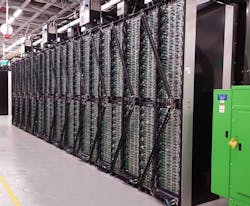New Year, New Outlook – What Does 2018 Hold for the Data Center?
In this edition of Voices of the Industry, Jeff Klaus, GM of Intel Data Center Management Solutions, explores how 2018 will shape out for the data center and colocation industry.
Jeff Klaus, GM of Intel Data Center Management Solutions
It’s that time of year again where industry professionals and enterprises alike reflect on the past year including its highs and lows, biggest wins and missed opportunities, all while setting forth new goals for the year ahead. And while the future will always bring a sense of uncertainty, arming yourself with the necessary insights in a quickly evolving and fast-paced industry can help your team leap into the New Year a softer landing.
Considering the proliferation of big data in nearly every aspect of business – from the boost in internet of things (IoT) devices both inside and out of the data center, to the growth of other data-intensive workloads – it is essential to a data center manager’s success to be prepared for any new or unexpected variables that the ever increasing complex data center infrastructure brings. In preparation for all that 2018 has to offer, below are three predictions to help data center managers and IT teams better prepare before finalizing next year’s data center strategy.
The DCIM Scale Continues to Tip
In 2017, a staggering 80 percent of US and UK based organizations cited having some level of infrastructure solution in place, according to Intel and Schneider Electric Research, showing immense promise on its value and market resonance. In 2018, the numbers will only continue to climb, and for good reason. As more data center managers across the globe understand these solution’s organization-wide impact, both from a monetary and business continuity perspective, infrastructure management will no longer be a luxury afforded by the largest companies with healthy IT budgets. Enterprises large and small will reap the benefits moving market share from 80 to 90 percent.
2018: The Era of Easier Data Acquisition and Decision Making
IT device communication has become more standardized with the introduction of Redfish and analysis tools that have more modeling and projection capability – making not only data acquisition a more seamless process but simultaneously enables more swift decision making for everyone within the IT ecosystem. In 2018, look for this reality to play out within future software products who leverage this capability and provide analysis from the data.
[clickToTweet tweet=”Jeff Klaus – IT device communication has become more standardized with the introduction of Redfish and analysis tools that have more modeling and projection capability. #datacenter” quote=”Jeff Klaus – IT device communication has become more standardized with the introduction of Redfish and analysis tools that have more modeling and projection capability. #datacenter”]
Data Center Manager’s Become the MVP of the Enterprise
When you think about the roles within an organization that typically get the most notoriety, you think of the CEO as the face of the company, a data scientist for making data actionable, or a CISO for keeping the org secure, but all too often overlooked is the man behind the curtain keeping the entire operation afloat: the data center manager. Enjoy your new product launch without a glitch? Appreciate cost savings at the power and thermal level? Experience an unexpected storm and maintain business continuity? The answer to all of these questions from anyone within the enterprise is undoubtedly, yes. In 2018, the role of the data center manager will become more important than ever as infrastructure becomes increasingly dynamic, enterprises opt for a hybrid approach and adopt colo-strategies. As your business maintains seamless continuity heading into the new year, you have your data center manager to thank, and you will this year more than ever.
So, whether you’re planning on overhauling your current strategy, implementing new cloud infrastructure tools or vying for new budget, there is no doubt that 2018 will bring forth a new set of opportunities and challenges for data center and IT teams as we know it.
Jeff Klaus is GM of Intel Data Center Management Solutions.


